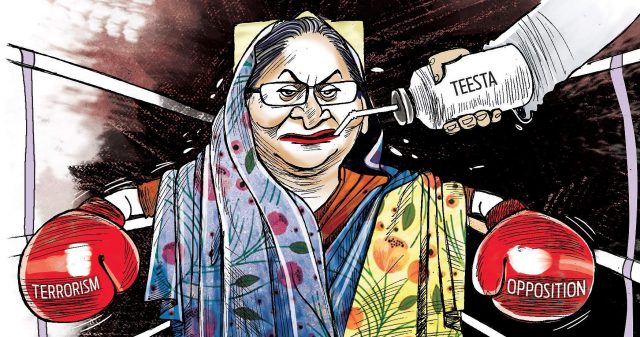
The recent visit of Bangladesh Prime Minister Sheikh Hasina to New Delhi and the several agreements she signed with Prime Minister Narendra Modi not only mark the high watermark in Indo-Bangla relations but also highlights the level of confidence of Sheikh Mujibur Rahman’s daughter in winning her people’s support in retrieving her country from the religious extremism of the previous regimes. Sheikh Hasina’s detractors including her political rival Begum Khaleda Zia had aligned with the very forces of extremism that the Sheikh had fought against in his battle for the independence of Bangladesh. These forces had opposed Dhaka’s struggle for independence.
They had aligned with the occupying Pakistani forces and were partners in the Pakistani atrocities against local Bengalis. That regime had not only suppressed the people, it also promoted extremists to drive out the minority Hindus and turned against Bengali culture and its secularism. This sowed the anger against Islamabad which later bloomed into the fight for an independent Bangladesh. The share of Hindus in the total population of Bangladesh was about 30 per cent during Partition. Sustained persecutions at the hands of Islamists forced a large number of Hindus to either flee or convert to Islam. So, their numbers are down to eight per cent.
The military regimes that followed the assassination of Sheikh Mujibur sought to shift the fundamentals of the new nation back to Islamic extremism and enable Pakistani intelligence to use Bangladesh’s extremist groups to harass India. Hasina had to fight an epic battle against these forces. They had even changed the Constitution to declare the country an Islamic state and tried to reinstate Pakistani terror merchants to let terrorists penetrate India and spray mayhem. Hasina has battled these extremist forces, clerics who aligned with Pakistan, the jihadi forces who wanted to erase memories of the Father of Bangladesh, Sheikh Mujibur.
The way she could get these jihadists to stand trial for conspiracy to murder the Sheikh, sentence several of them and beat back her rival Zia who was in collusion with the pro-Pakistani clerics reads like a novel. Sunday’s agreements between India and Bangladesh include cooperation in defence and fight against terrorism, among other points of contact and working together to keep the Indian subcontinent free from the threat of jihadism. Bangladesh is now inviting more Indian capital and the communication links are being widened to establish Dhaka as a platform through which the two countries can reach out to resource-rich East and South east Asia.
But the story is not completely successful. The Bangladeshi prime minister has not overtaken all her enemies politically. She has not managed to defeat the forces motivated by extremist Islamist ideology. It is in this context that we should view the political assessment of India and Bangladesh’s failure to overcome their differences over sharing the waters of the Teesta. Any agreement on water sharing—between two states and even within our country— is a tortuous process as no one wants to give an inch. With more and more farmers living on the edge of anxiety over the potential loss of natural resources, this is no longer a smooth affair.
Emotion takes over the language of reason. So, patient negotiation is the only option left. That the agreement on sharing the Teesta river water has not been concluded in this visit could become a stick in the hands of the critics of the Bangladesh prime minister for politically weakening Hasina. West Bengal Chief Minister Mamata Banerjee has been refusing to budge even an inch on this issue. She has constantly raised fears over the Bengal farmers losing out in a deal over the Teesta water sharing. New Delhi should not be seen as unsympathetic to Dhaka’s claim regarding natural resource sharing and utilisation. This is vital to our diplomacy with Bangladesh. Meanwhile, Pakistan is watching Indian diplomacy succeeding in South and Southeast Asian countries and in her immediate circle of countries except Pakistan itself.
New Delhi must expect every effort by Islamabad to disrupt the ring of Indian success in Nepal, Sri Lanka, Myanmar, etc. It would be unfair of the critics of the TMC leader to compare Pakistan’s anti-India diplomacy with Mamata’s disruption of the Modi government’s agreement on Teesta to consolidate ties with Dhaka. Nor is it possible for any government in New Delhi to restrain enforcement agencies from taking action against the TMC leaders found to be taking or having taken bribes from the several Ponzi “entrepreneurs” who are under investigation. These actions were initiated by the enforcement agencies before the BJP was voted to power at the Centre.
Kolkata has already seen the Supreme Court reverse any concession the various agencies like Enforcement Directorate and CBI are making in these cases. On the other hand when TMC and Mamata’s political standing is being buffeted by corruption charges and other criticisms, an initiative by her to work with the Centre in consolidating the Look East policy would enhance her political standing as she would be seen as overcoming her party’s interests and promoting national interest even at the cost of her personal politics. In a democracy, all parties have to work together especially in foreign policy. Within the country there may be many claimants to better governance but there is only One India when it comes to national interest vis a-vis the comity of competing nations.
Balbir Punj
Former Rajya Sabha member and Delhi-based commentator on social and political issues
Courtesy: The New Indian Express














